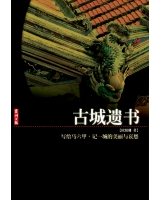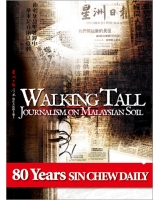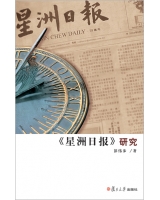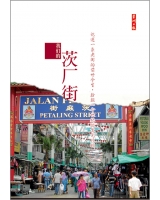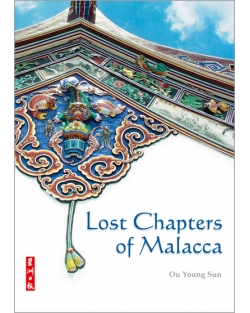 點圖放大 |
|
||||||||||||||||||
簡介:
Malacca is the most important historical city in Malaysia and it is also a well known domestic and international tourist destination.
There are countless writings introducing Malacca but not one that is written by a Malaccan in Chinese before "Lost Chapters of Malacca".
Unlike any general academic writing(s) or travel guides, "Lost Chapters of Malacca" records the interesting stories of Malacca's history, culture and monuments that the writer stumbled upon while sauntering her historical town.
"Lost Chapters of Malacca" is about what you know and what you don't know of Malacca.
內文摘錄:
-
If the Walls Stood Still
Everyone, like you and I, has a name. However, only a selected few are passed down from generation to generation. Of course, the ones admired by later generations are the ones that actually deserve such honour and appreciation. It is not difficult to understand why it would be debated and opposed against, when a street named after someone respectable, is renamed.
The Malay Peninsula was once identified as Malacca in the very old world Atlas. In fact, the name of Malacca seem more well-known to many foreigners than Malaysia itself. It is no wonder that Malacca has been classified as the one and only historical city in Malaysia.
Both historical heritage and names survive the passage of time because there are reasons for them to be appreciated. Once in a while, you would hear someone who is so proud of a house he or she has built, for it would be historical heritage in a hundred years. Nonetheless, the speaker might neglect the fact that this particular house may share the same fate as many of the forgotten names.
The ignorance of many Malaysian towards cultural heritage coupled with the incredible commercial pressure for development will inevitably result in the possible loss of such heritage. Indeed, there's a fat chance that what I am writing now will be passed on as legacy.
If the profit-minded entrepreneurs, who aim starkly for jumping on the tourism bandwagon, stop and ponder for one moment: that if the fortress that stood in the ancient city of Malacca, remained in one piece to this present day, how immensely valuable it would be? It would be impossible to put a price tag on such a heritage, from both the points of view of heritage preservation and tourism. The fact remains, that the English demolished the fortress in 1807, and left us with the gate only.
Flagged as the historical city, after losing the A Famosa two hundred years ago, one can still find substantial historical streets and houses in Malacca. These old streets and houses, which once stood next to the A Famosa, are part and partial of Malacca. Without these living museums, we would be left with no more than a few antique specimens.
In contrast to how the English brought down the fortress by explosives in matter of moments, we have the Malaccans eating away the old houses and the old streets, bits by bits. All in the name of development, fuelled by ignorance to heritage preservation, renovation, demolition and construction have been transforming what is left of the historical state into hotels, cafes and even houses for swiftlet farming.
Malacca was still a British colony when the A Famosa was pulled down in 1807. There was no saying no to the colonisers. Ironically, when the Malaccans finally own the land of Malacca and the right to say no, we are still not ready to reject development that omitted elements of heritage preservation.
Tourism has become a goose that lays golden eggs since the days of Asian financial crisis back in 1997. It seems that as the tough gets going, we live only for the golden egg today, but have no regards for the sustainability of the goose .
Development is believed to be a passport to a better life amongst developing countries. On the contrary, the developed ones look towards the opposite direction – nature, origin and culture. It is a delicate and brittle balance to strike for between salvaging the national, even world heritage, and development. As for Malacca, it is imperative that we achieve the said balance. Otherwise, the tiny gate left of the once mighty fortress probably would not stand for long.
Should we continue chipping away cultural heritage, the historical city passed down would indeed be in name only. After penning "The Fallen Ancient City", the series of writing based on Malacca may actually become the inheritance for future.
7 July 2002
作者簡介:
Ou Young Sun (pseudonym of Lye Phat Chin), was born in Malacca.
She was assistant editor of Sin Chew Daily based in its head office before she returned to her hometown in 1999 to take up the position of Malacca based reporter.
Since then, she embarked on her Malacca writing project that lasted for more than a decade.
She adopted her pseudonym in July 2002 when she started her column with Sin Chew Daily to share her findings on Malacca. The column ran in three stages:"A Posthumous Letter from Tomorrow", "Casting a Look at Malacca" and "The Inside Out of the Fortress".
She won the Huazong Literature Award on Factual Reporting with her article "The Account of the Red Wall", an article featuring Malacca, in 2007.
Her column that lasted 6 years concluded by the end of 2007, accumulating a total of 126 articles.
This book is a compilation of her articles from the series "A Posthumous Letter from Tomorrow" and "Casting a Look at Malacca".








 購物車
購物車